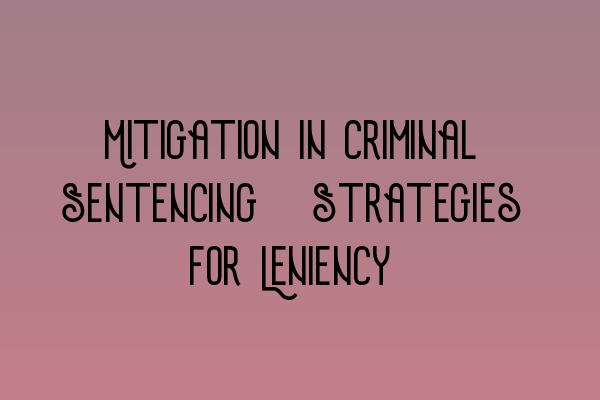Mitigation in Criminal Sentencing: Strategies for Leniency
When it comes to criminal sentencing, presenting strong mitigation can make a significant difference in the outcome of a case. Mitigation refers to the presentation of evidence or circumstances that can help reduce the severity of punishment. It is an essential aspect of criminal defense, and having a well-planned mitigation strategy can greatly increase the chances of receiving a more lenient sentence.
Understanding the Importance of Mitigation
In the criminal justice system, judges have the discretion to consider a range of factors when determining a suitable sentence. These factors include the seriousness of the offense, the defendant’s criminal history, the impact on the victim, and any aggravating or mitigating circumstances surrounding the crime. Mitigation focuses on presenting evidence and arguments that highlight the defendant’s positive attributes or circumstances that might justify a lesser sentence.
Effective mitigation strategies can help humanize the defendant, demonstrating that they are not simply defined by their criminal actions. By emphasizing their personal characteristics, background, and the potential for rehabilitation, the aim is to influence the judge’s perception and encourage a more favorable outcome.
Developing a Comprehensive Mitigation Strategy
A successful mitigation strategy requires careful planning and thorough preparation. Here are a few key steps to consider:
- Gather Relevant Information: Collect all necessary documents and evidence that can support the mitigation. This may include character references, employment history, educational achievements, and evidence of community involvement.
- Identify Appropriate Witnesses: Determine who can provide credible testimony about the defendant’s character, achievements, and potential for rehabilitation. These witnesses may include family members, friends, employers, or professionals such as counselors or therapists.
- Prepare the Defendant: Help the defendant understand the importance of mitigation and guide them in presenting themselves in the best possible light. This may involve coaching on courtroom etiquette, delivery of testimony, and overall demeanor.
- Collaborate with Experts: Consult with expert witnesses, such as psychologists, psychiatrists, or substance abuse specialists, who can provide professional insight into mitigating factors like mental health issues or substance dependency.
By following these steps and working closely with the defense team, a well-rounded and persuasive mitigation strategy can be developed.
Presenting Mitigation effectively
When presenting mitigation, it is crucial to communicate the key points clearly and convincingly. Here are some tips to help ensure an effective presentation:
- Craft a Compelling Narrative: Present the defendant’s life story, emphasizing their positive attributes and any hardships they have overcome. This can help shape a more empathetic and understanding perception.
- Evidence-Based Arguments: Support your claims with solid evidence, such as testimonials, certificates, or records that demonstrate the defendant’s achievements, contributions, or efforts toward rehabilitation.
- Address the Impact on the Victim: Acknowledge the harm caused while also highlighting efforts the defendant has made to make amends, compensate the victim, or engage in restorative justice practices.
- Emphasize Potential for Rehabilitation: Present evidence of the defendant’s willingness to change, such as participation in educational programs, counseling, or community service. Show that they possess the capacity to become law-abiding citizens.
By utilizing these techniques, the defense can effectively argue for a more lenient sentence and increase the chances of a favorable outcome in the sentencing process.
For more resources related to criminal law and practice, you may find the following articles helpful:
- SQE 1 Practice Exam Questions
- SQE 1 Practice Mocks FLK1 FLK2
- SQE 2 Preparation Courses
- SQE 1 Preparation Courses
- SRA SQE Exam Dates
Remember, every case is unique, and the strategies and evidence presented for mitigation should be tailored to the specific circumstances. Seeking the guidance of an experienced criminal defense solicitor can greatly assist in developing a strong and effective mitigation strategy.
